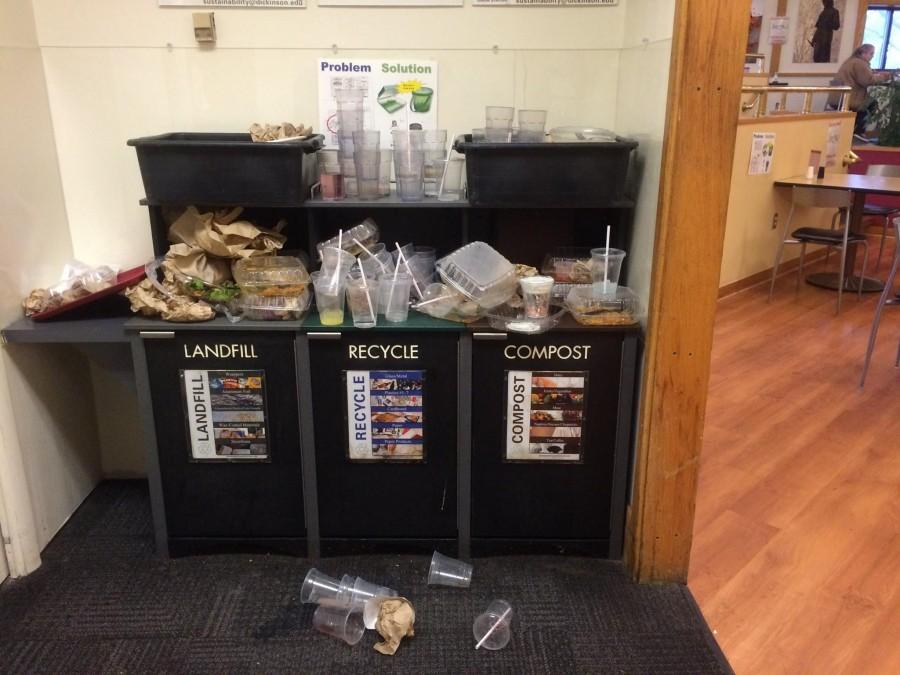Campus Waste Management
Photo Courtesy of Marina Morton ’18
Waste builds up in the Union Station trash area.
Union Station accrues the most food waste of all dining services locations on campus, according to Errol Huffman, director of Dining Services and Michaela Shaw ’17, sustainability intern for Dining Services.
Dickinson College produces 600 meals worth of compost each day, 60 percent of which is post-consumer waste, including food left on plates after meals. The other 40 percent is pre-consumer waste from the dining hall kitchen in the form of natural products such as vegetable trimmings.
“The biggest issue that we have is over at Union Station,” states Huffman. “It’s the most glaring example for students to see. What I would like to see students do, is when the staff asks them ‘is it for here or to go?’ just say ‘here’ and eat the food on china plates.” Huffman would also like to encourage the use of Grab-and-Go containers for meals.
“I think the foundation for a successful waste management program is in place, but student compliance is the limiting factor,” says Shaw. “Dining Services and other organizations like CSE [Center for Sustainability Education] can certainly aid in this improvement by increasing awareness through better advertising.”
According to Huffman, landfill waste contributes the least amount of waste. To make sure that recycling is carried out efficiently, Dining Services works with Advanced Disposal, a company providing the collection, transfer, disposal and recycling operation of waste products across the country. Foods that were not used or consumed during meal periods are then either frozen or donated to the Salvation Army, Project Share or Safe Harbor.
“Everything in the cafeteria is compostable…with the exception of the envelopes [that] the tea bags come in. We are very careful to make sure that anything we purchase … are not only compostable, but meet USDA [United States Department of Agriculture] Organic Certification Requirements,” says Huffman.
Once organic items are collected from the dining room, they are fed through a Hobart pulping unit, which extracts most of the water and grinds up waste. The compost materials will then be sent to the College Farm, where compost buckets will be checked again for non-organic materials.
“We tell students about [the recycling] process and where each of these [items] will go and show them what is going to happen to them. We make it very clear to our dish room staff why it’s very important [that] they stop the Hobart system if they drop something accidentally,” says Huffman.
Training sessions on waste conduct are held regularly, depending on the different dining locations and jobs. In the cafeteria, supervisors and managers lead the initial training. Blue Shirt student workers are then invited to hold their own trainings for other workers. In places like the Quarry, supervisors work with students to assist them on what to do with waste products.
“I feel very confident on what we are doing. Waste is mostly on the consumer side. When students are taking food, try to see ‘Ok, what it is that I am going to eat?’ instead of trying to sample all things at one time,” maintains Huffman on how to reduce waste.
“One of the areas where we could do a lot better is getting both employees and students to do a better job of separating the things that are recyclable,” said Neil Leary, director for the Center for Sustainability Education. He also encourages people to talk to EcoReps in dormitories and find out ways to be more effective in handling food.
Huffman also encourages students to provide feedback about their concerns. “I read every napkin that goes up… I check the board a couple of times a day, every day, usually towards the end of meal periods. I have an open door, I check emails, I take appointments. [I am] willing to take up any issues students have,” he says.
Ideas about reducing waste or promoting the use of plates at Union Station can be sent to Huffman [[email protected]] or Nick Wagaman, Dining Hall manager [[email protected]].






